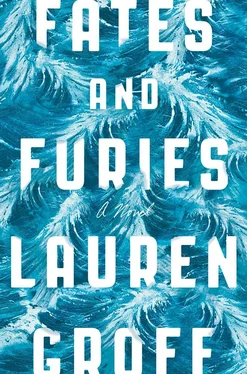Mathilde was wary, watchful. When he finally came to bed, she turned to him in her sleep, clinging, she who never wanted to be touched while she slept. He woke with her hair in his mouth, an arm somehow gone missing until he sat upright and felt the blood coming painfully back.
At last, a day in early October, a new chill in the air, he got Leo Sen on the telephone. The voice was not what he was expecting. It was soft and hesitant, British accent, which surprised him at first; and on second thought, well, India had been colonized; the educated class certainly would have fine-grained BBC inflections. Was this racist? He wasn’t sure.
“You said Lancelot Satterwhite?” Leo Sen said. “This is a thrill.”
“A thrill for me,” Lancelot said too loudly in his discomfort. He had imagined this so often it was strange, now, to hear the soft voice, to be told, first, that he was admired. He was expecting Leo Sen to be isolated in his genius, to be irritated by contact. Leo Sen explained: There was no Internet on the island where he lived, and the phone worked only when someone was around to answer it. It was an intentional community. Dedicated to humble daily work and contemplation.
“Sounds like a monastery,” Lancelot said.
“Or a nunnery,” Leo said. “Feels like it sometimes, too.”
Lancelot laughed. Oh! Leo had a sense of humor, what a relief. In his gladness, Lancelot found himself describing his reaction to Leo’s work at the opera house in the summer, how it rocked something in him. He used the word great , he used the phrases sea change and sui generis .
“I’m so glad,” Leo Sen said.
“I would do almost anything to collaborate on an opera with you,” Lancelot said.
The silence was so long he almost hung up, defeated. Well, good effort, Lancelot, it wasn’t in the stars, sometimes things don’t work out, back up on that horse, head down and into the wind, onward, pardner.
“Sure,” said Leo Sen. “Yes, of course.”
Before they hung up, they agreed on a three-week residency at an artists’ colony for them both in November. Lancelot was owed a favor and he thought he could get them in. The first day or so, Leo had to finish a commission for a string quartet, but they could start thinking, talking things over. Then they would have endless, relentless work for the next three weeks until they had some ideas, maybe even a stab at the book.
“What do you think?” said Leo’s voice on the line. “The concept part is actually the most difficult for me.”
Lancelot looked at the bulletin board in his office, where he’d pinned at least a hundred ideas, a thousand ideas. “I think the concept part won’t be a problem for us,” he said.
—
IN THE MORNING, Mathilde went whirring off on an eighty-mile bike ride. Lancelot undressed and looked at himself in the mirror. Oh, middle age, how awful. He was used to having to look for his lost beauty in his face, but not in his body that had been so tall and strong all his life. Now, though, the wrinkles in the skin of his scrotum, the swirl of gray in the chest hair, the fetal neck wattle. One chink in the armor and death seeps in. He turned this way and that until he found the angle that made him look the way he’d been before his impromptu flight down the stairs in the spring.
Over his shoulder, he saw God on the bed, watching him, her chin on her paws.
He blinked. He gave a brilliant grin at the Lancelot he saw in the mirror, winking and nodding and whistling through his teeth as he put his clothes back on, even brushing imaginary dust off the shoulders of his sweater, picking the pills, making a satisfied grunt before hurrying off as if remembering an urgent chore.
—
AND THEN IT WAS NOVEMBER and they were spinning past the thwarted graying fields, over the Hudson, into Vermont, New Hampshire. A hush in the air, a gathering of energy.
In his feverish preparations, Lancelot had lost ten pounds. He’d spent hours on the stationary bicycle, because only movement made him think. Now his knees jerked to some music inaudible to Mathilde, who drove.
“I’ve narrowed the ideas down to five, M.,” he said. “Listen to this. Retelling of Maupassant’s ‘The Necklace.’ Or ‘The Little Mermaid,’ the opposite of Disney. Andersen, but extended to even more extreme weirdness. Or the trials of Job, but kooky, funny-dark. Or interlocking stories of soldiers in Afghanistan that together tell a kind of longer story, like Chronicle of a Death Foretold . Or The Sound and the Fury in opera form.”
Mathilde bit her bottom lip with her long incisors and looked only at the road.
“Kooky?” she said. “Funny-dark? People don’t really think opera and funny. You think fat ladies, solemnity, Rhinemaidens, women killing themselves for the love of a good man.”
“Opera has a long tradition of humor. Opera buffa. It used to be the primary entertainment for the masses. It’d be nice to democratize it again, make it popular entertainment. Make the mailman sing it on his rounds. He looks as if he’s hiding a beautiful voice under that little blue uniform.”
“Yes,” she said. “But you’re known for your lyricism. You’re serious, Lotto. Exuberant, sometimes, but not funny.”
“You don’t think I’m funny?”
“ I think you’re hilarious. I think your work isn’t really funny, though.”
“Not even Gacy ?” he said.
“ Gacy was dark. Wry. Humorous in a bleak way. Not funny, per se.”
“You think I can’t be funny?” he said.
“I think you can be dark, wry, and humorous in a bleak way,” she said. “For sure.”
“Splendid. I will prove you wrong. Now, what do you think of my ideas?”
She made a face and shrugged.
“Oh,” he said. “None of those.”
“Lots of retellings,” she said.
“I mean, not the Afghanistan one.”
“No,” Mathilde said. “True. That’s the only great idea. Maybe too on-the-nose, though. Too obvious. Make it more allegorical.”
“Brank your tongue, witchy-wife,” he said.
Mathilde laughed. “Maybe this is something that both of you will have to agree on anyway. You and this Leo Sen of yours.”
“Leo. I feel like a teenager all dressed up in cummerbund and bow tie, heading off to the winter dance,” he said.
“Well, my love, this is how people sometimes feel when they meet you,” Mathilde said gently, gently.
His cabin was small, stone, with a fireplace, not so far from the main house where dinner and breakfast would be, and he worried for the first time about ice, about falling with his still-flimsy leg. There was a desk, a chair, and a bed that was normal size, which meant his legs would hang off up to the shins.
Mathilde sat at the edge of it and bounced. The frame squeaked like a mouse. Lancelot sat next to her and bounced to her offbeat. He put his hand on her leg and moved it, bounce by bounce, up her thigh until his finger was pushing against her groin, and then he hooked it under her elastic and found an anticipatory lushness there. She stood, and he stopped bouncing, and without pulling the curtains, she pushed the crotch of her panties to the side and straddled him. He put his head up her shirt, loving the companionable darkness there.
“Hello, Private,” she said, teasing the tip of him. “Atten-hut.”
“Three weeks,” he said, as she escorted him in. She moved her hips like a cowgirl. He said, “Long time without release.”
“Not for me. I bought a vibrator,” she said breathlessly. “I named him Lancelittle.”
But this wasn’t the right thing to say, perhaps, because he felt pressured and had to turn her around on her hands and knees to complete things, and the punctuation was a pallid little orgasm that left him discontented.
Читать дальше












